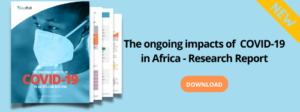One of the biggest challenges governments and health institutions face in slowing the spread of COVID-19 in sub-Saharan Africa is the prevalence of false information and myths about the vaccine. As more vaccine becomes available, concerns about vaccine hesitancy caused by misinformation and disinformation remain high.
As part of its study in April 2021 on the ongoing economic, social, and health impacts of the Coronavirus pandemic in sub-Saharan Africa, GeoPoll asked respondents in Côte D’Ivoire, the Democratic Republic of Congo (DRC), Kenya, Mozambique, Nigeria, and South Africa about their likeliness to take the vaccine when it becomes available – and when they think that might be. We also asked if they have been provided enough trustworthy information about the vaccine and about any concerns they might have.
This article draws from that study, focusing on perceptions, expectations, and concerns about the COVID-19 vaccine. You can access the full interactive result dashboard and download the report for free here.
Trustworthy Vaccine Information
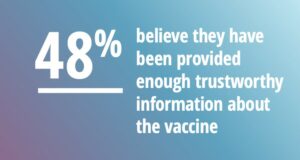 After living with the pandemic for more than a year, many questions and uncertainties remain. In this study, less than half the respondents (48%) believe they have been provided enough trustworthy information about the COVID-19 vaccine. Persistent rumors around the vaccine have clearly degraded peoples’ confidence in the information available to them and demonstrate the importance of stakeholders battling misinformation around vaccines.
After living with the pandemic for more than a year, many questions and uncertainties remain. In this study, less than half the respondents (48%) believe they have been provided enough trustworthy information about the COVID-19 vaccine. Persistent rumors around the vaccine have clearly degraded peoples’ confidence in the information available to them and demonstrate the importance of stakeholders battling misinformation around vaccines.
Likeliness to Get the Vaccine
Respondents’ likeliness to get the vaccine mirrors their trust in the information available about the vaccine. Only 48% of respondents across countries said they would probably or definitely get the vaccine right away if it was available for free. That is down from 62% in our previous study in November 2020, further illustrating the impact of continued negative information about the vaccine.
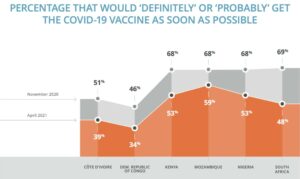
Concerns About the Vaccine
Overall, the top reasons why respondents may not get the vaccine are uncertainty about its effectiveness and potential health risks. That does not hold true in each country, however, as shown in the chart below.
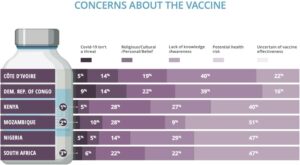
Expectations About Vaccine Availability
Looking ahead, the opportunity to interrupt virus transmissions and initiate social and economic recovery in sub-Saharan Africa largely hinges on the availability and distribution of vaccines. All of the sub-Saharan African countries included in this study have initiated limited vaccination programs, mainly procured through the COVID-19 Vaccine Global Access (COVAX) Facility, but at this point there are simply not enough doses available to approach herd immunity.
The delayed rollout of the vaccine so far in Africa has pushed back when respondents from all six countries in this study expect the vaccine will be available to the public.
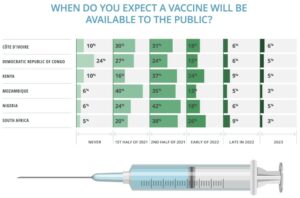
In our study in November 2020, 31% believed a vaccine would be available in the first half of 2021. Only 10% believed it would be available in the second half of 2021 and 5% believed it wouldn’t be until 2022. In this study, the percentage that believe the vaccine will be available in the first half of 2021 dropped from 31% to 26%. The percentage that believes the vaccine will be available in the second half of 2021 jumped from 10% to 34%, and the percentage that predict it will not be available until 2022 or later jumped from 5% to 30%.
Follow GeoPoll for Continued COVID-19 Research
Throughout 2021, GeoPoll will continue to monitor the long-term implications of COVID-19 and sentiments towards a vaccine in sub-Saharan Africa and around the globe. Sign up to be updated when GeoPoll releases new COVID-19 research, and please contact us if you require additional information regarding this study or would like to conduct your own research using GeoPoll’s mobile- based data collection capabilities and global reach.

